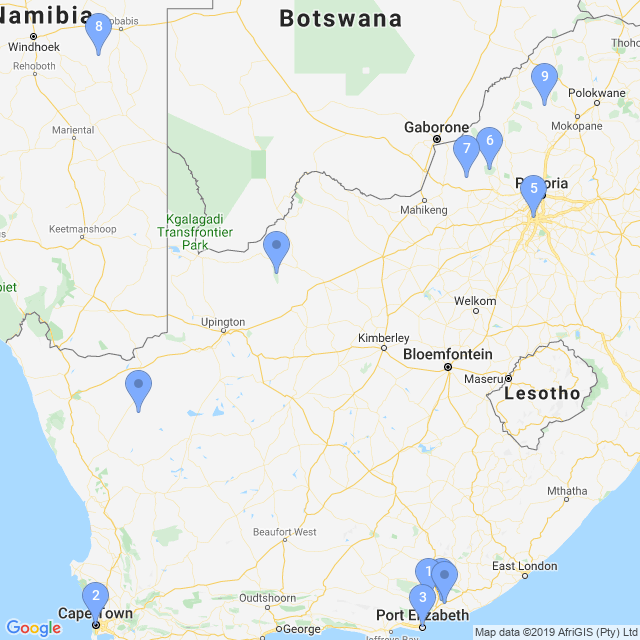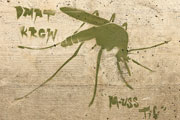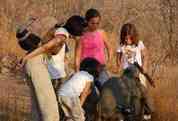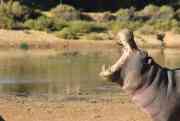Top tips for the best Malaria Free Safaris in South Africa
Mosquitoes, specifically the female of the species, are not really anybody’s best friend. Firstly, their high-pitched voices are not a great lullaby and, secondly, they can transmit malaria.
The last thing you want to experience halfway through your South African safari is a feverish headache, chills, and relentless vomiting … all symptoms of dreaded malaria.
 Mosquito crossing by Cayobo
Mosquito crossing by Cayobo
Stop the 4X4! Before you change your mind and rather spend your well-earned holiday with the in-laws in a remote region of the Arctic, the team here at African Budget Safaris has laid it all out for you in this blog – everything you need to know about a malaria-free safari adventure in South Africa, which is totally possible.
We’ve got all the latest info to help you negotiate a safe and healthy safari – if you travel on your own with a well-thumbed notebook, with your partner, the family (young and old) or friends, or on a guided safari tour – and it doesn’t even matter what your blood type is.
A bit about the bite
Before we answer the question, “What does ‘malaria-free’ mean?” let’s make a quick pit stop at malaria itself. The cause is a one-celled parasite known as a Plasmodium. (You may wipe this term from your memory banks after reading this section.)
 Mosquito by James Jordan
Mosquito by James Jordan
Mrs. Mozzie (it’s the female mosquito who’s the guilty party) picks up the parasite from infected people when she bites to obtain blood needed to nurture her eggs. Inside the mosquito, the parasites go nuts – they reproduce and develop. When the mosquito bites again, the parasites contained in the salivary gland make a beeline for the blood of the person being bitten. Rest assured, it won’t be you if you simply follow our advice.
Malaria parasites multiply in the liver; next stop – the red blood cells of the infected person. One to two weeks – sometimes longer – after a person is infected, the first symptoms of malaria (as if you need a reminder) appear. That’s when it’s time to see the doctor, pronto. For a full malaria overview, check out our blog, Malaria Made Simple.
Before we scare you off, let’s stop there. There are numerous safari options in South Africa that are free of malaria. Let’s get into what you need to know to play it smart and safe before leaving home. We also recommend that you have a chat with your doctor before you hop on the plane.
First up then – are there South African safaris that are malaria-free?
Yes, South Africa has malaria-free safari game parks and so too do certain areas within the neighboring countries, Namibia and southern Botswana (note, the swampy inland Okavango Delta is not malaria-free, neither is Etosha. It’s just the very dry, southern regions of the two countries). For more info of the exact areas, check out the WHO’s International Travel Guide, the CDC’s Yellow Book or chat to your local Travel Clinic).
Right, back to South Africa. If you want to enjoy a world-class safari experience, but don’t see yourself gulping down malaria prophylaxis tablets, there are a number of phenomenal game-viewing locations with none of the mosquitoes that carry the disease. This is reason enough for choosing a malaria-free safari.
 Just chillin' by Andrew Rice on Unsplash
Just chillin' by Andrew Rice on Unsplash
Now for a fact as sure as an African elephant has tusks: South Africa is the only country in the whole of Africa that can officially offer a complete malaria-free safari experience. The rest of Africa offers a malaria risk, even if it’s small – which increases during the rainy seasons.
So, before we shout it from the rooftops, just remember this: not every safari destination in South Africa is free from malaria. African Budget Safaris has your back, so we've put together a wonderful selection of assured malaria-free safari regions, void of any mozzies that carry the disease:
- Eastern Cape
- North West Province (including the Pilanesberg National Park and Madikwe Game Reserve)
- Waterberg District in the province of Limpopo
- Northern Cape
- Cape Town and surrounds – situated in the Western Cape Province
Reserves in these areas offer phenomenal game-viewing experiences, so you needn’t think you’re on the receiving end of sloppy seconds in the safari department by undertaking a malaria medication-free trip.
So, what does the description ‘malaria-free’ really mean?
According to the World Health Organization, it is an area where there is “no continuing local mosquito-borne malaria transmission and the risk of acquiring malaria is limited to introduced cases only”.
Malaria-free Eastern Cape Safaris
The Eastern Cape is rapidly becoming a safari-goers dream spot, with numerous wonderful game reserves to suit any budget, all of them free of malaria.
 Zebra crossing by Bert Sz on Unsplash
Zebra crossing by Bert Sz on Unsplash
For the full story on the Eastern Cape and all it offers, take a look at our blog, See the Big 5 at the Eastern Cape’s Best Malaria Free Game Reserves. Here, we’ll just mention a couple because, well, they’re fabulous!
Addo Elephant National Park
As its name suggests, Addo is known for its huge elephant population, but it offers an all-round superb malaria-free safari experience, including the ‘Big 7’. The third biggest game park in South Africa, it’s home to the well-known five and – added bonus – two marine ‘biggies’, the great white shark and southern right whale.
Addo is an easy day trip from Port Elizabeth, but we’d recommend staying a night or two at one of the wide range of accommodation offers in the park. There’s nothing like going to sleep to the sounds of the bush. Some of the African Budget Safari tours that include Addo are:
- Full-Day Addo Elephant Park Big 5 Safari
- 3 Day Addo Elephant Park Safari
- Lesotho & Drakensberg to Addo Overland Camping Safari
Amakhala offers up everything but mosquito bites
It’ll take you less than an hour’s drive from Port Elizabeth’s national airport in the Eastern Cape, to arrive at another malaria-free Big 5 safari destination: Amakhala Game Reserve. The region is known as Frontier Country and the reserve is in an area called the Greater Addo.
Amakhala hosts five of the world’s six vegetation biomes, from bushveld to savannah, amidst 8 500 hectares of land. Cheetah, giraffe, zebra, black wildebeest and a heady number of antelope also rank amongst the diverse wildlife. Game drive activities are on offer with each overnight stay, but should you wish to experience the diverse reserve and not stay over, day safaris are an option.
The reserve offers a great variety of 3-, 4- and 5-star owner-managed experiences. Choose your preferred accommodation from a selection of ten luxury establishments consisting of restored country houses, safari lodges or tented camps.
In amongst the wildlife quenching their thirst at the river’s edge, the rare Cape Clawless Otter with its long grey-white whiskers might just hijack a photo op or two. Check out our 5 Day Addo Park & Amakhala Big 5 Safari.
Shamwari will have you swooning
Right, before you get down to the nuts and bolts of planning the next step of your South African safari experience, here’s another gem of a game reserve to consider visiting in the Eastern Cape, also malaria-free.
 Nibbling rhino by Kevin Folk on Unsplash
Nibbling rhino by Kevin Folk on Unsplash
Shamwari is regarded as the pinnacle of private game parks (and naturally home to the Big 5). Indulge in exclusive tranquillity and a real sense of harmony with nature. The reserve stretches languidly along the Bushman's river, halfway between Port Elizabeth and Grahamstown. The Eastern Cape Province, being a malaria-free zone, makes Shamwari ideal for families with kids or elderly members, who might be vulnerable to illness.
The game drives the reserve offer are exceptional, most certainly the highlight of many a returning safari-goer. The team of personal game rangers has an intimate knowledge of the area – you’ll be taken directly to the best spots where the wildlife is prolific.
Malaria-free North West Safaris
The North-West and Limpopo provinces both border Gauteng, so are driveable from Johannesburg. For more close-to-Jozi parks, see our blog Best Game Reserves for Short Safaris near Johannesburg. Both provinces have a number of great game reserves, most of them malaria-free (excluding eastern Limpopo, in which the Kruger Park lies, which is malarial). Here, we list a few of them.
Pilanesberg National Park
The largest Big 5 reserve within easy driving distance of Johannesburg (2 to 3 hours) is the Pilanesberg National Park, a 550 km2 area. It’s situated in a transition ecological zone, between the dry Kalahari region and the wet Lowveld region, giving it diverse habitats and, therefore, wildlife.
Madikwe awaits
The Madikwe Game Reserve is in the North West Province, bordering Botswana near Gaborone and close to the Kalahari Desert, and only a 3.5-hour drive from the city of Johannesburg’s OR Tambo International Airport. It’s the country’s fifth-largest game reserve in a malaria-free zone – also known as the ‘Hidden Gem of Game Parks’ and widely regarded as one of the best conservation areas in Africa.
Here, the Big 5 roam about in the 750 km2 (75 000 ha2) park. Choose from several luxurious lodges dotted around the reserve – each offering a unique experience of this wildlife hotspot as well as authentic Community Lodges run by local villagers – you can expect fantastic views of the reserve – and the wonderful surprise of some of the wildlife grazing in close proximity! Mouth-watering meals prepared by trained chefs at many of these lodges ensure a feast of note, along with safari game drives hosted by experienced and characterful guides.
 Running wild by Tambako the Jaguar
Running wild by Tambako the Jaguar
Apart from spotting lion, leopard, elephant, rhino, and buffalo, there is a thriving population of the highly endangered African wild dog in the reserve. Three hunting packs roam the area. You asked for an authentic African safari experience … well, you’ve got one!
The dogs are fascinating to observe. Initially the pack will run around, sniff and play amongst each other. They’re a noisy bunch – belting out high-pitched chirps. An alpha male and female will be the first to set off, followed by the rest of the pack at a brisk trot, all tails a-flickering – only to slip into the bush for the hunt. Antelope usually fall prey, but they can also tackle much larger prey, such as wildebeest. The wild dogs will otherwise supplement their diet with birds and rodents.
Malaria-free Northern Cape Safaris
 Namaqualand in spring by Malcolm Manners
Namaqualand in spring by Malcolm Manners
While relatively ‘off the beaten track’, as distances are large, the Northern Cape deserves a mention, not least for its spectacular flower season, when vast areas are a proliferation of color, covered in wild flowers in spring, but also for its game parks including Tswalo, Mokala, and the spectacular Augrabies Falls Reserve.
Tswalu is another wonderful malaria-free safari destination
Welcome to the vast and mesmerizing Tswalu Kalahari with its magical vistas. ‘Space’ is the operative word here. The ‘Green Kalahari’ is a slice of nature offering a wonderful twist. The name ‘Kalahari’ is derived from the Tswana word Kgala, meaning The Great Thirst, or Kgalagadi, meaning The Waterless Place.
The southern Kalahari receives somewhat more rainfall than the central Kalahari. This is why it is often referred to as the ‘Green Kalahari’. Within the reaches of Tswalu lie the Korranaberg Mountains, a quartzite structure connected to the Olifantshoek Supergroup. The mountains form a massive basin, which acts as a natural catchment area and with a healthy water table to boot, to support a fantastic number of wildlife.
 Hello! by Jon Hunter on Unsplash
Hello! by Jon Hunter on Unsplash
This then is South Africa’s largest private game reserve. It’s malaria-free, so guests do not have to worry about popping anti-malaria tablets. It’s ideal for families on safari – they, in fact, welcome children and make every effort to make the little people’s safari experience endless fun under the African sun (pack sunscreen Mom!).
Their game viewing is out of this world – offering sightings of some of the country’s rarest and most extraordinary wildlife. There are over 80 species of mammals and 240 species of birds (including endangered raptors), at Tswalu, which is also home to the elusive aardvark, aardwolf, pangolin and brown hyena. Because the land is so expansive, you’ll feel as if you’re the only people for hundreds of miles. No more standing on tiptoes, craning necks for a view of a beautiful Cape fox, warming up in the morning light or nudging the 4X4 towards the VIP spot to watch the wildlife descending on a watering hole.
 Cheetah by David Groves on Unsplash
Cheetah by David Groves on Unsplash
The San engraving sites at Tswalu have the most beautiful and advanced examples of the Green Kalahari’s early inhabitants. Detailed stories reflect the lives of these hunter-gatherers. The engravings on the hard rock were made with materials such as sharp stones and spears. It’s a fascinating link to an ancient time.
The philanthropic Oppenheimer family took the landscape under their wing in 1998. Because of their commitment to conservation, you, the safari-goer can marvel at the indigenous species that’ve been successfully re-introduced. The mantra here at Tswalu is, “Leave the world better than how we found it.” Very fitting.
Malaria-free safaris near Cape Town
We understand that Cape Town is a must-see – we choose to live here exactly for that reason! – so it’s sometimes a dilemma to decide how to squeeze a safari into a short holiday and include The Mother City.
 Table Mountain by Tiaan van Zyl on Unsplash
Table Mountain by Tiaan van Zyl on Unsplash
Timing and budget may not allow for the inclusion of the iconic Kruger Park. Fret not, there are a number of Big 5 reserves within a reasonable distance of The Mother City, which are suitable for day trips or longer. So much so, that we have two separate blogs for them:
Now to answer a couple of FAQs we get:
Is the Kruger National Park malaria-free?
No, the Kruger National Park is not malaria-free. The following info comes straight from the Kruger’s HQ: during the months when the rain falls on the bushwillow vegetation in the south of the park and the great expanse of mopane veld in the north, there is an increased risk of malaria. When the rainy season wraps up in April, the risk of infection is low.
So, the recommendation is always there to take malaria prophylaxis when visiting the park. Incidentally, during the daytime, there is no risk of infection; the malaria mosquito is only active at night in those areas up to 600 m (1 967 ft) above sea level.
 Family walk by Sutirta Budiman on Unsplash
Family walk by Sutirta Budiman on Unsplash
There are various mosquito species in the park, but not every mosquito causes a transmittance when the host is bitten. So, let’s talk about probability. The chance of being stung by said mozzie is 1 in 24 000 – it’s low, but it doesn’t mean you shouldn’t take precautions. Note that 10% of all malaria cases occur because visitors have not taken the necessary preventative measures.
‘Protection’ is the operative word. Pack items of clothing that will hide your skin, such as safari pants that close around your ankles. When it’s dark, wear socks, even if it’s warm. You won’t get strange looks when you wear a hat at night. It helps! Rest assured, there are as many mosquito lamps in this premier game-viewing destination as there are rock dassies basking on boulders.
Can I visit game reserves in South Africa that aren’t malaria-free?
Yes, you can visit game reserves in South Africa that aren’t malaria-free, provided you take all the necessary precautions. Malaria is endemic in the game reserves situated in the Lowveld of Mpumalanga and in Limpopo. In KwaZulu-Natal, it’s endemic on the Maputaland coast. These areas are in the north/northeast of South Africa. Our advice is to consult a healthcare professional for the latest on malaria prophylaxis as it changes quite often. The cities of Johannesburg, Durban, and Cape Town are all free from malaria and safe for safari travelers of all ages.
 Mosquito nets by David Jones
Mosquito nets by David Jones
To recap: we’re happy to report that no anti-malaria drugs need to be taken in the following low-risk areas: North West Province and the Northern Cape along the Molopo and Orange Rivers, (we’re including the Augrabies Falls and the Kgalagadi Transfrontier Park), Eastern and Western Cape. Here, malaria might be locally transmitted, only occasionally though. You must still take precautionary measures for prevention.
What are the precautions I should take, in both malaria, and malaria-free areas?
Some tips are repetitive, yet it makes for a proper checklist. Following this advice is a good idea, malaria area or not. No one wants to be scratching itchy bites all holiday:
- Apply insect repellent, lavishly, to exposed skin
- Close windows and doors at night if they aren’t screened
- Spray an aerosol insecticide inside where your sleeping area is
- Burn mosquito coils and mosquito mats
- Sleep under a mosquito-proof bed net… “Sweet dreams” by the way
- Wear long-sleeved clothing, trousers, and socks when in the great outdoors
These safari-goers are especially at risk of malaria, so take extra precautions:
- Kids under 5
- Adults over 65
- Pregnant women
- Those on long-term steroids
- If receiving chemotherapy
- People with HIV, porphyria or epilepsy
- If you’ve had your spleen removed
- Chronically ill patients
As mentioned above, for a full malaria overview and what precautions you need to take if you’re going into a malaria area, check out our blog, Malaria Made Simple.
Is there a malaria risk when I'm back at home?
A person may still contract malaria even though all precautionary measures have been taken and it may take some time for symptoms to show. If headache, fever, muscular and joint pains, sweating, shivering attacks, nausea, diarrhea, and fatigue occur after a safari (up to six months after your return), a GP should immediately be consulted. Also, inform the medical staff of your visit to the malaria area to ensure proper diagnosis and treatment.
The reasons you need to visit South Africa’s malaria-free game reserves
- You don’t need to worry about taking antimalarials before leaving home, during your safari adventure or on your return.
- Most of these non-malarial game reserves welcome Junior – even if s/he is of the age where diapers fill the greater half of your suitcase. In fact, these game reserves are geared to cater for kids of all ages. For more on kid’s safaris, see our blog, Great tips on the safety of your family on safari in Africa
 Hippo by Stefan Steinbauer on Unsplash
Hippo by Stefan Steinbauer on Unsplash
- You’re still guaranteed to experience the jaw-dropping presence of the Big 5 in their natural habitat (cue Pilanesberg Game Reserve in the North West or Marakele National Park in the Waterberg District).
- The location of these reserves allows for further exploration of beautiful South Africa.
And then finally, please allow us to exit with a mosquito joke. Feel free to share it around the bush campfire …
A man in a movie theatre notices what looks like a mosquito sitting next to him. "Are you a mosquito?" asked the man, surprised.
"Yes."
"What are you doing at the movies?"
The mosquito replied, "Well, I liked the book."
You’re welcome.
What’re you waiting for? Contact one of our knowledgeable travel consultants and get your dream malaria-free safari in South Africa booked.
If you liked this post, these trips cover similar ground…
- 5 Day Cape Town, Garden Route & Addo Safari (Backpacking Tour)
- 7 Day Lesotho & South Africa Safari: Durban to Addo (Lodge)
- 4 Day Private Garden Route Tour from Cape Town (return)
- Big 5 Cape Town Safari to Aquila Game Reserve - Budget Day Tour
- 3 Day Cape Town Safari - Big 5 Budget Tour
- 2 Day Cape Town Safari - Big 5 Budget Tour




 Briony is a qualified pharmacist, published author and travel blogger living in Cape Town. She writes her own blog about travel, the arts, music and the good things in life, with a focus on accessibility. She likes watching the world go by, and sometimes it makes her nose twitchy, but mostly it provides golden nuggets with which to light up the page.
Briony is a qualified pharmacist, published author and travel blogger living in Cape Town. She writes her own blog about travel, the arts, music and the good things in life, with a focus on accessibility. She likes watching the world go by, and sometimes it makes her nose twitchy, but mostly it provides golden nuggets with which to light up the page.












